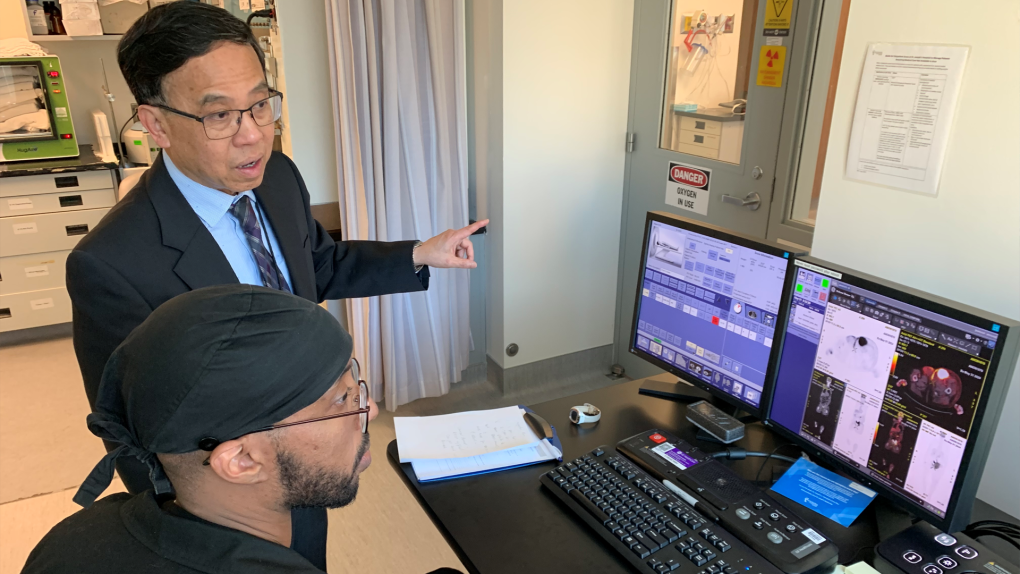First in Canada imaging technology means less stress, less radiation for patients at St. Joseph’s
Inside the Molecular Imaging and Theranostics Department at St. Joseph’s Health Care in London, Ont. (formerly Nuclear Medicine), a patient is prepped for imaging.
She was moved inside the giant tube and scanned from head to toe. In the room next door, medical staff monitored the images coming in on their screens.
A procedure that used to take about 45 minutes is now down to less than 15 minutes.
Because of the speedier process, patients are exposed to less radiation.
“Comparing our old scanner to the current scanner, we would be able to do about one patient per hour,” explained Stephen Nelli, the director of Medical Imaging and Breast Care at St. Joseph’s. “Whereas now we’re looking at about two to three patients per hour. So that effect multiplied over a year is very significant.”
Nelli and other medical professionals at St. Joseph’s are singing the praises of Canada’s first, next generation, state of the art Omni Legend PET/CT, installed at St. Joseph’s last September.
With images from AI driven technology, doctors say they can precisely detect abnormalities or disease, including cancer and early signs of Alzheimer’s.
 Medical Physicist Ting-Yim Lee and an imaging technologist study PET/CT images at St. Joseph's Health Care on May 31, 2024. (Bryan Bicknell/CTV News London)
Medical Physicist Ting-Yim Lee and an imaging technologist study PET/CT images at St. Joseph's Health Care on May 31, 2024. (Bryan Bicknell/CTV News London)
“Using this machine, we would be able to detect abnormalities in the brain that would eventually lead to Alzheimer’s,” said Ting-Yim Lee, director of PET/CT Research at Lawson Health Research Institute (Lawson) and medical physicist at St. Joseph’s Hospital. “And now there are drugs available that would be able to kind of stop the decline of going into cognitive problems.”
Nelli added, “A lot of patients are more familiar with the CT or CAT scan that shows the anatomy within your body, and a PET/CT is that CAT scan, but if you can imagine, it’s like somebody going through it with a highlighter and exactly pin-pointing where he physician needs to look.”
Nervous patients walk through the hospital doors every day and find themselves in overwhelming situations. But the new technology and new approach to treatment can make their experience that much more comfortable, said Nelli.
“Being able to give them the confidence that they’re going to be able to get their scans quickly and they don’t have to endure a long scan means the world to them,” he said.
The new PET/CT is expected to lead to groundbreaking clinical research in areas such as breast cancer, prostate cancer, Alzheimer’s disease, epilepsy, and obesity.
“This is a fantastic direction for us to push not only the research, but also is improving the health care of the patients that we are seeing in this hospital,” said Ting.
CTVNews.ca Top Stories

Calls for change to B.C.'s child protection system after disturbing case of neglect
Is B.C.'s child protection system outdated and in need of a major overhaul? The province's representative for children and youth believes so, and that 'a new model' is needed.
Ont. mother loses $6K during Facebook marketplace transaction
An Ontario woman is sharing her story after she lost $6,000 by clicking a fraudulent link disguised to look like an e-transfer during a Facebook Marketplace transaction.
Rapper Travis Scott arrested for disorderly intoxication, trespassing early Thursday
American rapper Travis Scott, whose legal name is Jacques Bermon Webster, was arrested and booked into Miami-Dade County Jail early Thursday morning, county jail records show.
Manitoba hit with five tornadoes last week
Tornado season entered Manitoba with a bang last week.
Train collision in Chile kills at least 2 people and injures 9 others
At least two people were killed and nine others injured Thursday when a train full of passengers collided head-on with another train on a test run just outside the capital of Chile, where fatal railway crashes remain rare.
Portion of Vancouver tenants spending half their income on rent: report
The path to homeownership in Vancouver is becoming increasingly out-of-reach for many renters.
Senators approve bill to fight foreign interference after voting down amendment
The Senate has passed a government bill intended to help deter, investigate and punish foreign interference.
Gunman in Toronto shooting was not evil, but 'broken' by fraud dispute: wife
The wife of the gunman in Monday's double murder-suicide in North York says she doesn't consider her husband an evil person, but one who was 'broken' by a lengthy fraud dispute that saw their family savings drained.
Illegally brewed liquor kills at least 34 with dozens hospitalized in southern India
At least 34 people have died and dozens hospitalized after drinking illegally brewed liquor in the southern Indian state of Tamil Nadu, local media reported on Thursday.


































